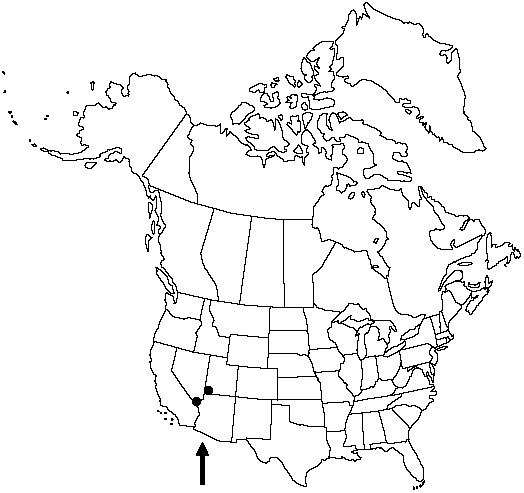Selaginella utahensis
Amer. Fern J. 39: 83. 1949.
Plants on rock or terrestrial, forming cushionlike mats. Stems decumbent to short-creeping, dry stems readily fragmenting, irregularly forked, without budlike arrested branches, tips straight; main stem upperside and underside structurally slightly different, inconspicuously indeterminate, lateral branches radially symmetric, determinate, strongly ascending, 1-forked. Rhizophores borne on upperside of stems, throughout stem length, 0.2–0.33 mm diam. Leaves monomorphic, in alternate pseudowhorls of 4, tightly appressed, ascending, green, linear-oblong to linear-lanceolate, seldom lanceolate-elliptic, sometimes falcate on lateral ranks (on main stem), 2–4.25 × 0.45–0.75(–1) mm (smaller on young ascending branches); abaxial ridges present; base cuneate and decurrent, rarely rounded and adnate, glabrous, seldom slightly pubescent; margins short-ciliate or denticulate to entire, cilia few, transparent, scattered, ascending to spreading, 0.02–0.1 mm; apex keeled, attenuate or obtuse, blunt or acute or ending in a very short bristle or mucro; bristle or mucro transparent to opaque, yellowish or whitish, smooth, 0–0.4 mm. Strobili solitary, 0.5–2 cm; sporophylls lanceolate to ovate-lanceolate, abaxial ridges moderately defined, base glabrous, margins short-ciliate to denticulate, apex short-bristled.
Habitat: Dry sandstone crevices, sandy soil or clay soil
Elevation: 1300–2300 m
Discussion
Selaginella utahensis is very closely related to, and can be easily confused with, S. leucobryoides. The leaf apex of S. utahensis is sometimes blunt, smooth, and rather opaque, or with a very short bristle or mucro, and its leaves are in defined alternate pseudowhorls of four. In contrast, S. leucobryoides has obvious whitish, puberulent
(rough) bristles, and the leaves are not in well-defined alternate pseudowhorls. The two species overlap in range and expressions of morphologic characters. They are treated here as separate species until additional studies can be carried out to determine whether or not they represent ecological variations of the same species or distinct species.
Of conservation concern.
Selected References
None.
